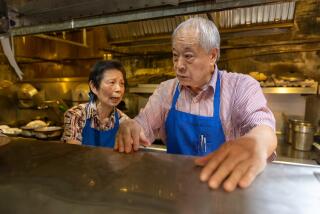Calcutta’s Chinatown Is Slowly Vanishing as Region’s Chinese Population Dwindles
- Share via
CALCUTTA — Chung Chin Nang runs a leather factory started 70 years ago by his grandfather and thinks he will probably die where he was born, in Calcutta.
His four sons and a daughter are likely to go the way of thousands of young Chinese from the east Indian port--to Western Europe, the United States and Canada.
“My children would leave India if the opportunity arises,” said the 68-year-old member of the Hakka people, who returned to China between 1937 to 1945 to fight in the Sino-Japanese war.
Once one of India’s largest foreign communities, the Chinese in Calcutta are declining in numbers, complaining of lack of jobs and discrimination by India, which fought a war with China in 1962 and has since viewed the community with suspicion.
The population of Calcutta’s Chinatown has shrunk from a peak of about 50,000 in the 1940s to 15,000, according to community leaders. About 10,000 other Chinese are scattered across India.
Immigrants left China in the 19th and early 20th centuries to find jobs and flee political and economic turmoil in their homeland.
They joined gold rushes in Alaska and California, built railways all over America, searched for tin and tapped rubber in southeast Asia, often going on to own laundry shops and restaurants in Chinatowns wherever they settled.
In Calcutta, the Chinese are mostly Hakkas but there are also Cantonese and Shanghainese who work as hairdressers, carpenters and have taken over the leather tanning industry.
Unlike those elsewhere, Calcutta’s Chinatown is vanishing.
Chinese vendors still sell steamed dumplings along Sun Yat Sen street in central Calcutta, but the original chophouses are gone. Noodles, dried mushrooms and bean curd, sought after by Chinese everywhere, can also be found--but with difficulty. The signs of the community’s fate are clear.
Yau Char Kwai (“devil fried in oil”), the Cantonese delicacy of deep-fried dough strips, is sold by Indians wielding chopsticks over a giant wok, next to Chinese competitors. Only during Chinese New Year does Calcutta’s Chinatown look like a Chinatown.
“The young people can’t find jobs here. Even though many have inherited family businesses, they want to leave Calcutta,” Chen Jung Ta, vice president of the Overseas Chinese Assn., said.
“They have their problems abroad too, but at least there is more freedom there,” said the 61-year-old Hakka, who also teaches in a Chinese school and publishes the Chinese Journal of India newspaper.
He said Chinese were bitter that they were treated as second-class citizens by the Indian government, which has granted citizenship virtually only to Chinese born after 1950. Older residents like Chen, numbering about 2,000, are still “British subjects” who are not allowed to travel easily within India or abroad, he said.
The Overseas Chinese Assn. receives tacit financial support from the Taiwanese government, which supplies textbooks, sold by the association to students in four Chinese schools, said Chen.
“The association helps Chinese obtain entry visas to Taiwan. If they want to stay on in Taiwan, it is up to them,” he said. “We cannot help people go to mainland China because we are anti-communist.”
Many older Calcuttan Chinese say they still look to China rather than Taiwan as their motherland.
“Our ancestors came from China, not Taiwan. If the political system changes, we may want to return there. (China’s senior leader) Deng Xiaoping looks like a better man than Mao Tse-tung,” said one old man.
Residents say they have few links with the Chinese Embassy in New Delhi for fear of being questioned by Indian authorities who keep a close watch on contacts.
Like overseas Chinese elsewhere, Calcuttan Chinese are more concerned with earning a living than with politics, running tanneries that process cowhide, shunned by Hindu Indians who regard the cow as sacred.
Much of the machinery is obsolete, but one tannery owner said: “We won’t invest in modern machines. Our children don’t want to take over the businesses. Besides, it might all be confiscated in the event of another Sino-Indian war.”
More to Read
Sign up for Essential California
The most important California stories and recommendations in your inbox every morning.
You may occasionally receive promotional content from the Los Angeles Times.













